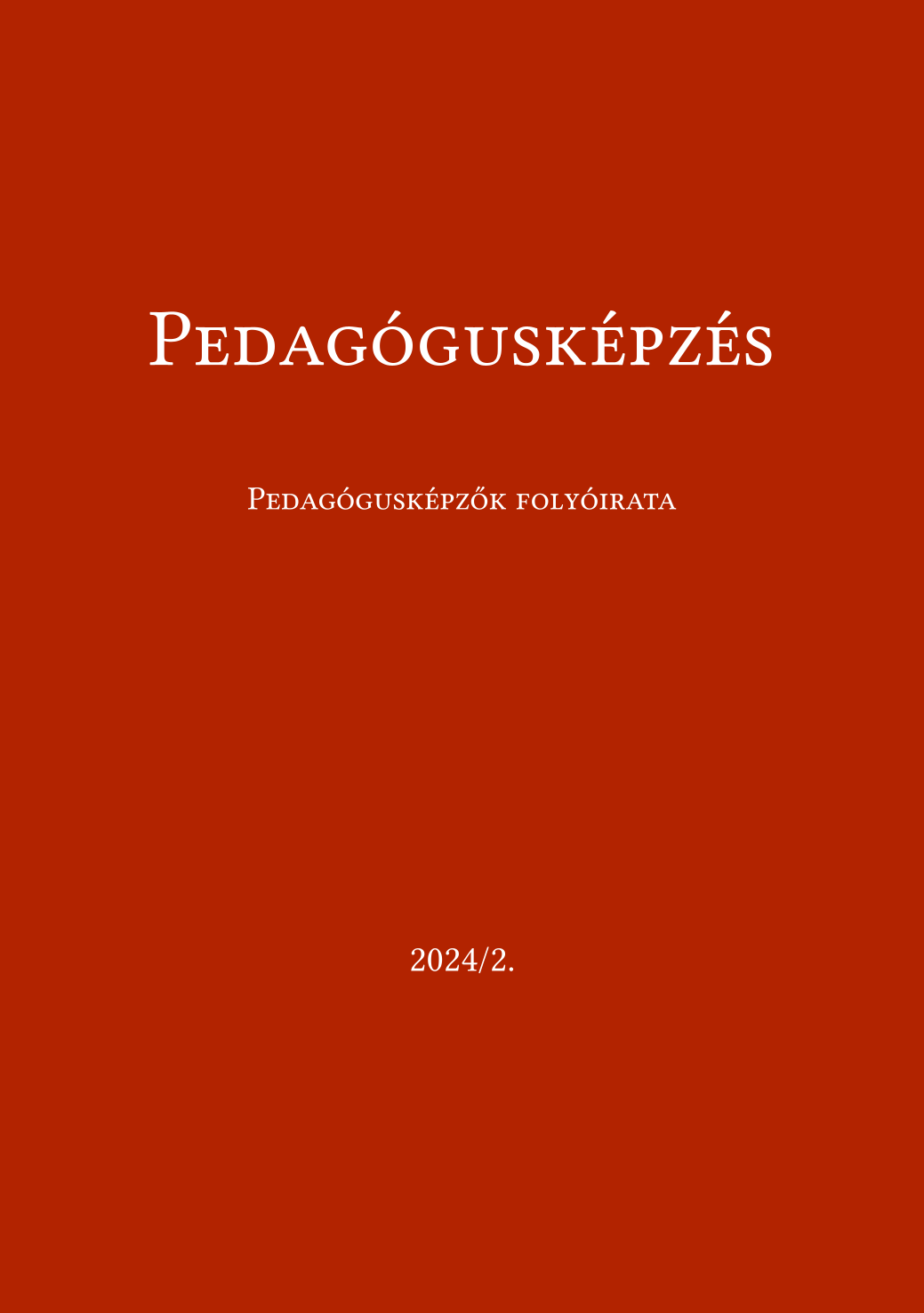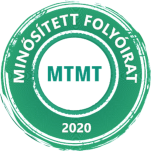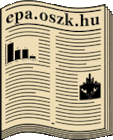The role of goals in school physical education: focus on pre-service physical education teachers
DOI:
https://doi.org/10.37205/TEL-hun.2024.2.01Keywords:
physical education, pre-service physical education teachers, physical education teacher education, National Curriculum, goalsAbstract
The documents regulating the subject of physical education (PE) define numerous goals. However, they provide less help for pre-service physical education teachers to determine which goals should enjoy priority during a decision-making process.
In our study, we compare the goals defined by the National Curriculum (2020) with the goals considered important by students majoring in physical education, because it is essential that public education and teacher education operate on the basis of uniform goals, values, principles and approach. The study concludes that according to pre-service physical education teachers, the most important goal of the subject is to make people love movement and sports and to develop general movement literacy. Furthermore, we found a marked difference between male and female students’ views, while their age and the progress already made in teacher education appeared to have only minimal influence on their opinions.
We claim that PE teacher education and PE in public education should operate along uniform guidelines, expectations, values and approach so that they can exert the optimal developmental effect.
References
Bognár, J. (2019). A testnevelés értékorientációja. Új Pedagógiai Szemle, 69(3–4), 100–108.
Bognár, J. (2020). A testnevelőtanár-képzésre vonatkozó dokumentumok egységessége az elvek, tar-talmak és értékek mentén: a képzési kimeneti követelmények, a pedagóguskompetenciák, a pedagó-guséletpálya-modell és a NAT 2020 összevetése. EKE Líceum Kiadó.
Capel, S. (2016). Value orientations of student physical education teachers learning to teach on school-based initial teacher education courses in England. European Physical Education Review, 22(2), 167–184. https://doi.org/10.1177/1356336X15596984
Csányi, T. & Révész, L. (2015). A testnevelés tanításának didaktikai alapjai – Középpontban a tanulás. 1. kiadás. Magyar Diáksport Szövetség.
Csányi, T. & Révész L. (2021). A testnevelés és sport oktatásának elmélete és módszertana – Közép-pontban a tanulás. Magyar Diáksport Szövetség.
Hamar, P. & Karsai, I. (2017). A testnevelés tartalmi korszerűsítésének ideája. Testnevelés, Sport, Tudo-mány / Physical Education, Sport, Science, 2(1–2), 10–14. https://doi.org/10.21846/TST.2017.1-2.1
Hurtik-Tóth, E., H. Ekler, J. & Tóth, L. (2023). Testnevelő tanár szakos hallgatók tanulás iránti elkötele-ződésének vizsgálata. Magyar Sporttudományi Szemle, 24(103), 63–68.
Kovács, K. E., Pusztai, G., Kovács, K. & Nagy, B. E. (2018). A felsőoktatási társas integráció és a hallgatói egészségmagatartás kapcsolata. Pedacta, 1, 41–59. http://hdl.handle.net/2437/259241 (2023.12.12)
Lee, H. (2015). Preservice Physical Education Teacher’s Value Orientations across the Student Teaching Semester. Doctoral dissertation, University of South Carolina. https://scholarcommons.sc.edu/etd/3700 (2024. 01. 05.)
Molnár, A. (2021). Testnevelő tanári példamutatás és az egészségmagatartás közvetítése a bemutatás módszerén keresztül. In Medovarszki, I. (Ed.), Tantárgy-pedagógiai kaleidoszkóp: 2021 – Pedagógiai, neveléstudományi és szakmódszertani tanulmányok (pp. 129–146). Magánkiadás.
Moravecz, M. & Kozma, B. (2022). Szocializációs színterek harca a különböző képzési szinteken tanuló pedagógushallgatók egészségmagatartásában. Magyar Sporttudományi Szemle, 23(4), 34–39.
Mustell, J., Geidne & S., Barker, D. (2023). The transfomation of ball game sas pedagogic discourse with-in physical education teacher education. European Physical Education Review. https://doi.org/10.1177/1356336X231207485
Nemzeti alaptanterv (2020). A Nemzeti alaptanterv kiadásáról, bevezetéséről és alkalmazásáról szóló 110/2012. (VI. 4.) Korm. rendelet módosításáról. Magyar Közlöny, 2020. 17. Igazságügyi Minisztérium. https://njt.hu/jogszabaly/2012-110-20-22 (2024. 09. 01.)
Pálinkás, R., Kinczel, A., Miklósi, I., Váczi, P., Laoues-Czimbalmos, N. & Müller, A. (2022). Lifestyle educa-tion, health education, environmental education, movement. Acta Carolus Robertus, 12(1), 129–142. https://doi.org/10.33032/acr.2812
Pill, S., Penney, D. & Swabey, K. (2012). Rethinking Sport Teaching in Physical Education: A Case Study of Research Based Innovation in Teacher Education. Australian Journal of Teacher Education, 37(8). https://doi.org/10.14221/ajte.2012v37n8.2
Rapos, N. & Szivák, J. (2015). Az osztatlan tanárképzés KKK-elemzésére épülő alapelveinek, képzési struktúrájának és tartalmának meghatározása. In Rapos, N. & Kopp, E. (Eds.), A tanárképzés megújí-tása – 2015. (pp. 11–30). ELTE Eötvös Kiadó.
Redelius, K., Quennerstedt, M. & Öhman, M. (2015). Communicating aims and learning goals in physical education: part of a subject for learning. Sport, Education and Society, 20(5), 641–655. https://doi.org/10.1080/13573322.2014.987745
Romar, J., E., Aström, P. & Ferry, M. (2018). Practical knowledge of preservice physical education teach-ers: Content and influence of acculturation. Journal of Physical Education and Sport, 18(1). 10.7752/jpes.2018.01015
Thomas, M. & Ti, M. (2021). Gender differences in physical education conceptual knowledge on physi-caleducation teacher education (PETE) students. International Journal of Physical Education, Sports and Health, 8(5), 99–105. https://www.kheljournal.com/archives/2021/vol8issue5/PartB/8-4-97-757.pdf (2024. 02. 01.)
Vajda, I., Major, Zs., Moravecz, M., Pásztorné, B., K., Vajda, T., Vajda, F., V., Oláh, D. & Nagy, A. (2018). Study on physical activity and health behaviour among students at the University of Nyíregyháza. Magyar Sporttudományi Szemle, 19(2), 22–26. https://mstt.hu/wp-content/uploads/2018/06/MSTT-Szemle-2018-02-honlapra.pdf (2023. 11. 25.)
Downloads
Published
How to Cite
Issue
Section
License
Copyright (c) 2024 The author(s)

This work is licensed under a Creative Commons Attribution-NonCommercial-NoDerivatives 4.0 International License.








